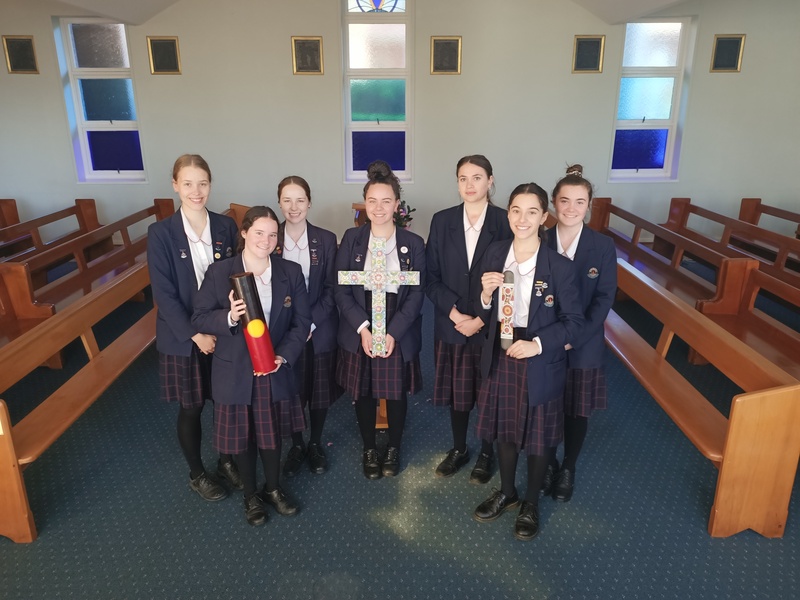National Sorry Day and National Sorry Week
National Sorry Day occurs annually on 26 May and National Reconciliation Week is a national campaign held each year from 27 May to 3 June to celebrate and build on respectful relationships shared by Aboriginal, Torres Strait Islander and non-Indigenous peoples.

Our Sorry Day Prayer service was led by senior students. (L to R) Emily, Stephanie, Mackenzie, Janaya, Bindi, Natalie, Breanna
Many adults may know the expression, “Sorry is as sorry does”. Each year, 26 May is designated as National Sorry Day and, as a College community, we started the day with a prayerful reflection. During the prayer it was noted that on 13 February 2008, the Australian people heard broadcast from the Australian National Parliament the historic words of the Apology to the Stolen Generations. Reflecting on the past (and present) mistreatment of Aboriginal and Torres Strait Islander Peoples, then Prime Minister, Kevin Rudd, said, “The time has now come for the nation to turn a new page in Australia's history by righting the wrongs of the past and so moving forward with confidence to the future.” They were brave words arising from a genuine desire for Australia to become a better nation.
However, “sorry is as sorry does” and it is with regret that the hope-filled words of the Apology have not yet been transformed into meaningful action so as to make a substantial difference to the quality of life for Aboriginals and Torres Strait Islanders. It is the challenge presented to all of us on each Sorry Day—the challenge to make things far better for Aboriginals and Torres Strait Islanders.
Our St Patrick’s Christian community formed in the Benedictine tradition and “established as a school for the service of the Lord” (Prologue to The Rule of St Benedict), is called to be “a light to the world” (words from the College Prayer) and to seek justice wherever there is injustice. Our first response to an event such as Sorry Day is to be aware. This is the first stage in the Catholic approach to social justice: the See, Judge, Act model. We need to firstly “see” a problem; to acknowledge what is happening to others; to face reality. Once we acknowledge the truth, our next challenge is to make appropriate judgements as to what we are called to be and do in the reality we face. In another way of putting this, judging is the process of determining what actions are necessary for the injustice to stop. Once we have decided on such actions, it is incumbent on us to follow through with enthusiasm the solutions.
Regrettably, it seems that we as a nation still have a long way to go in the process of full reconciliation as we have heard the news, during this very Sorry Week, that an extremely profitable mining company was legally able to destroy the Juukan Gorge 1 and 2 Aboriginal rock shelters dating back 46,000 years. These sites had deep historical and cultural significance. While ever our nation keeps putting profit as our top priority, we will continue to erode the dignity of people as well as disrespecting the planet that gives us life.
Let us implore our God, that following the example of Jesus, we will “love one another” as we have been loved by a God who nurtures us and who cares for each individual who enters into personal relationship with the God who saves. May we keep striving for a better world for all.
Angelo Gattone - Mission Coordinator